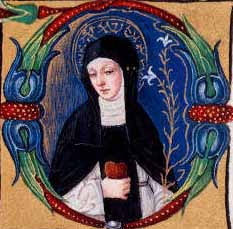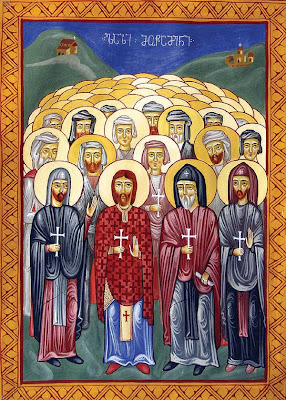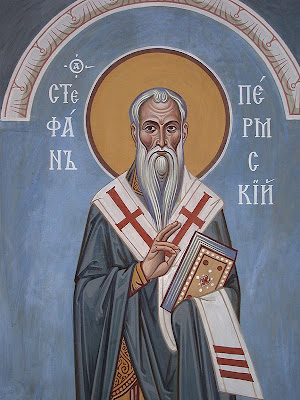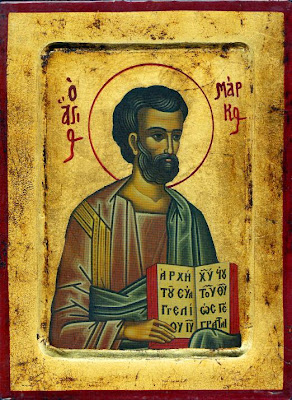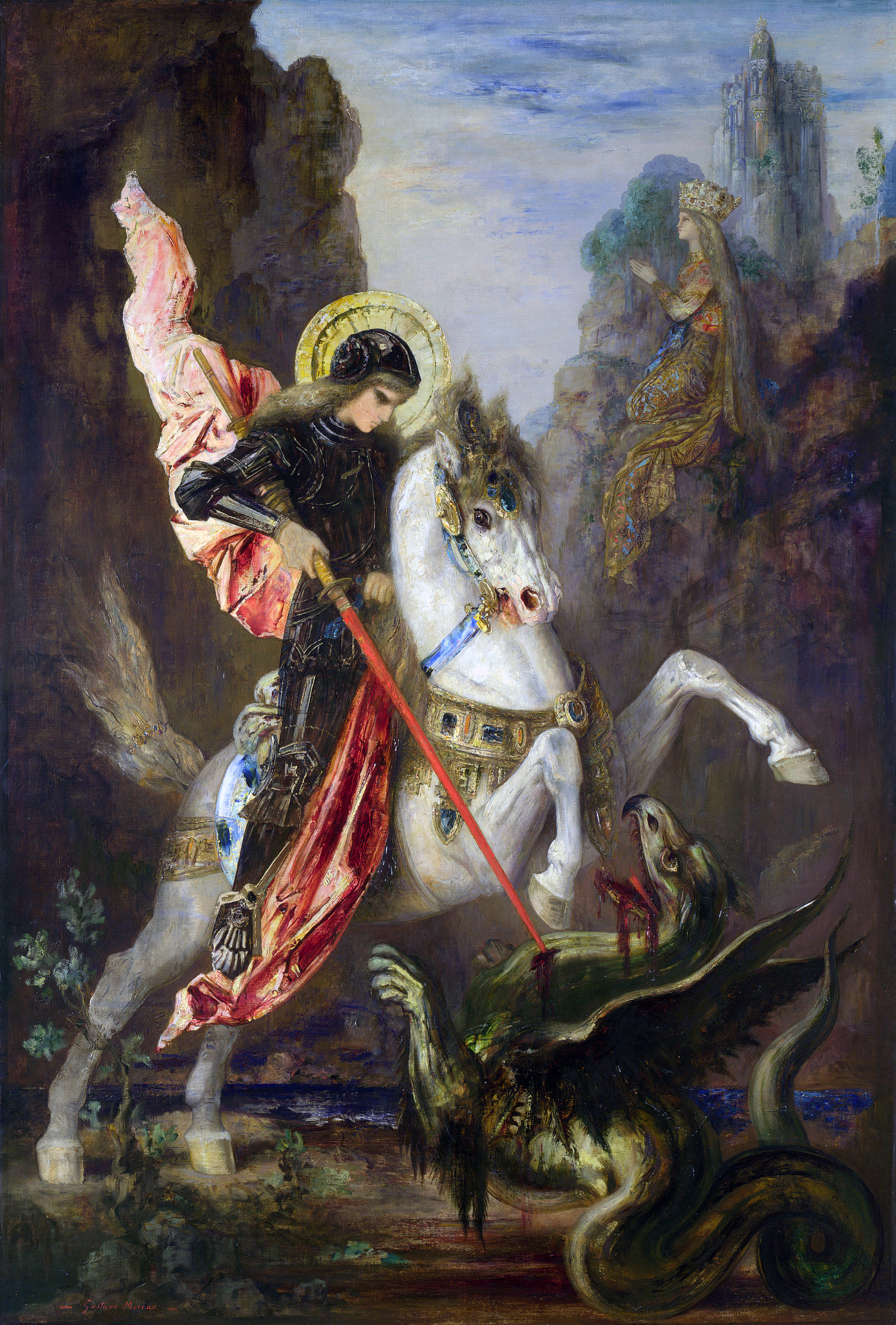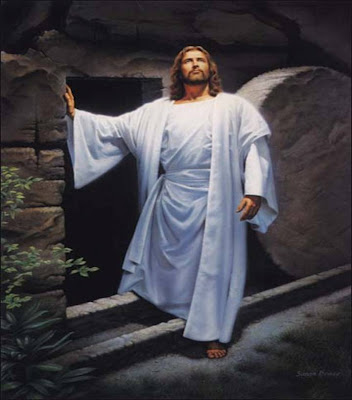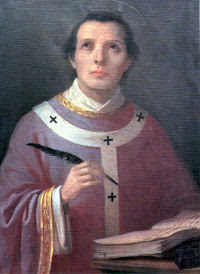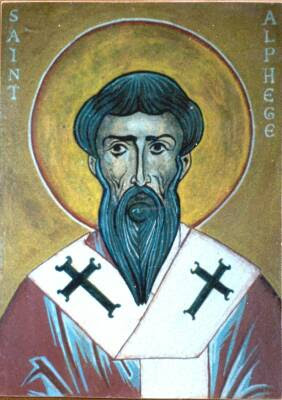 (also Ercenwald, Erkenwald or Erconwald; died 693) was Bishop of London in the Anglo-Saxon Christian church between 675 and 693.
(also Ercenwald, Erkenwald or Erconwald; died 693) was Bishop of London in the Anglo-Saxon Christian church between 675 and 693.Erkenwald was born at Lindsey and was supposedly of royal ancestry. Erkenwald gave up his share of family money to help establish two Benedictine abbeys, Chertsey Abbey in Surrey in 661 for men, and Barking Abbey for women. His sister, Æthelburg, was Abbess of Barking, while he served as Abbot of Chertsey.
In 675, Erkenwald became the Bishop of London, after Wine. He was the choice of Archbishop Theodore of Canterbury. While bishop, he contributed to King Ine of Wessex's law code, and is mentioned specifically in the code as a contributor. He is also reputed to have converted Sebba, King of the East Saxons to Christianity in 677. Current historical scholarship credits Erkenwald with a large role in the evolution of Anglo-Saxon charters, and it is possible that he drafted the charter of Caedwalla to Farnham. King Ine of Wessex named Erkenwald as an advisor on his laws.
Erkenwald died in 693 and his remains were buried at Old St Paul's Cathedral. His grave was a popular place of pilgrimage in the Middle Ages, and was destroyed together with a number of other tombs in the cathedral during the Reformation.
Erkenwald's feast day is 30 April, with translations being celebrated on 1 February and 13 May.
Earconwald of London - 30 April - Abbot and Bishop
The Collect.
O GOD, by whose grace the blessed Earconwald enkindled with the fire of thy love, became a burning and a shining light in thy Church: Grant that we may be inflamed with the same spirit of discipline and love, and ever walk before thee as children of light; through Jesus Christ our Lord. Amen.
The Epistle - Philippians 3:7-15.
HOWBEIT what things were gain to me, these have I counted loss for Christ. Yea verily, and I count all things to be loss for the excellency of the knowledge of Christ Jesus my Lord: for whom I suffer the loss of all things, and do count them but dung, that I may gain Christ, and be found in him, not having a righteousness of mine own, even that which is of the law, but that which is through faith in Christ, the righteousness which is of God by faith: that I may know him, and the power of his resurrection, and the fellowship of his sufferings, becoming conformed unto his death; if by any means I may attain unto the resurrection of the dead. Not that I have already obtained, or am already made perfect: but I press on, if so be that I may apprehend that for which also I was apprehended by Christ Jesus. Brethren, I count not myself yet to have apprehended: but one thing I do, forgetting the things which are behind, and stretching forward to the things which are before, I press on toward the goal unto the prize of the high calling of God in Christ Jesus. Let us therefore, as many as be perfect, be thus minded: and if in anything ye are otherwise minded, even this shall God reveal unto you.
The Gospel - St. Luke 12:22-37.
JESUS said unto his disciples, Therefore I say unto you. Be not anxious for your life, what ye shall eat; neither for the body, what ye shall put on. The life is more than meat, and the body is more than raiment. Consider the ravens: for they neither sow nor reap; which neither have storehouse nor barn; and God feedeth them: how much more are ye better than the fowls? And which of you by being anxious can add a cubit to his span of life? If ye then be not able to do that which is least, why are ye anxious for the rest? Consider the lilies how they grow: they toil not, they spin not; and yet I say unto you, that Solomon in all his glory was not arrayed like one of these. If then God so clothe the grass, which is to day in the field, and to morrow is cast into the oven; how much more will he clothe you, O ye of little faith? And seek not ye what ye shall eat, or what ye shall drink, neither be ye of anxious mind. For all these things do the nations of the world seek after: and your Father knoweth that ye have need of these things. But rather seek ye the kingdom of God; and all these things shall he added unto you. Fear not, little flock; for it is your Father's good pleasure to give you the kingdom. Sell that ye have, and give alms; provide yourselves bags which wax not old, a treasure in the heavens that faileth not, where no thief approacheth, neither moth corrupteth. For where your treasure is, there will your heart be also. Let your loins be girded about, and your lamps burning; and ye yourselves like unto men that wait for their lord, when he will return from the wedding; that when he cometh and knocketh, they may open unto him immediately. Blessed are those servants, whom the lord when he cometh shall find watching: verily I say unto you, that he shall gird himself, and make them to sit down to meat, and will come forth and serve them.
Reference and Resources:
http://www.celticsaints.org/2012/0430b.html
http://en.wikipedia.org/wiki/Earconwald
http://www.earlybritishkingdoms.com/adversaries/bios/eorcenwald.html
†
